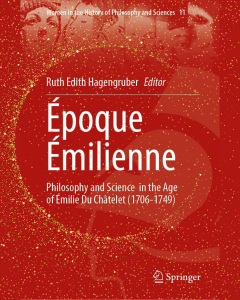 In anticipation of Émilie du Châtelet’s birthday, we are pleased to present the volume Époque Émilienne. The volume is edited by Ruth E. Hagengruber, Director of the Center for the History of Women Philosophers and Scientists. She has worked tirelessly to make Émilie du Châtelet’s work visible.
In anticipation of Émilie du Châtelet’s birthday, we are pleased to present the volume Époque Émilienne. The volume is edited by Ruth E. Hagengruber, Director of the Center for the History of Women Philosophers and Scientists. She has worked tirelessly to make Émilie du Châtelet’s work visible.
About the book: The present book contextualizes Du Châtelet’s contribution to the philosophy of her time. The editor offers this tribute to an Époque Émiliennee as a collection of innovative papers on Émilie Du Châtelet’s powerful philosophy, science and legacy. To call an epoch an Époque Émilienne may be seen as daring and audacious, but it will not be the last time if we continue to bring women philosophers back into the memory of the history of philosophy.
The contributors paid attention to the philosophical state of the art, which forms the background to Du Châtelet’s philosophy. They follow the transformation of philosophical concepts under her pen and retrace the impact of her ideas.
The book is of interest to scholars working in the history of philosophy as well as in gender studies. It is of special interest for scholars working on the 18th century, Kant, Leibniz, Wolff, Newton and the European Enlightenment.
Ruth E. Hagengruber says about the book: “This is–—to my knowledge—the first time an edition of scholarly papers dedicated to a female philosopher has been presented that demands that an epoch in the history of philosophy be named after that philosopher: it brands this epoch in the history of philosophy as the Époque Émilienne. Du Châtelet deserves the honor of standing among the most influential philosophers of the European Tradition. It is rather remarkable, instead, that her intellectual power, the high esteem Du Châtelet enjoyed in her lifetime did not allow her to become part of that illustrious tradition of names we associate with the Enlightenment. The broad spectrum of her scientific and philosophical contributions, and her numerous and notable publications make her appear to be one of the most outstanding figures of the epoch. With Du Châtelet, this volume takes a different perspective on the question of how to write the history of philosophy from now on, considering the writings of women philosophers.”
Here is a small selection of the articles that are in the volume:
Hagengruber, R.E. (2022). Du Châtelet and Kant: Claiming the Renewal of Philosophy. In: Hagengruber, R.E. (eds) Époque Émilienne. Women in the History of Philosophy and Sciences, vol 11. Springer, Cham. https://doi.org/10.1007/978-3-030-89921-9_3
There is more to discover: Get the book here.
If you want to contribute to the Springer Book Series send a Book Proposal to Ruth E. Hagengruber,Mary Ellen Waithe, and Gianerico Paganini. The Springer Series Women in the History of Philosophy and Sciences provides a platform for publishing cutting-edge scholarship on women’s contributions to the sciences, to philosophy, and to interdisciplinary academic areas. The Springer Series Women in the History of Philosophy and Sciences will publish monographs, handbooks, collections, anthologies, and dissertations.
You cannot copy content of this page








